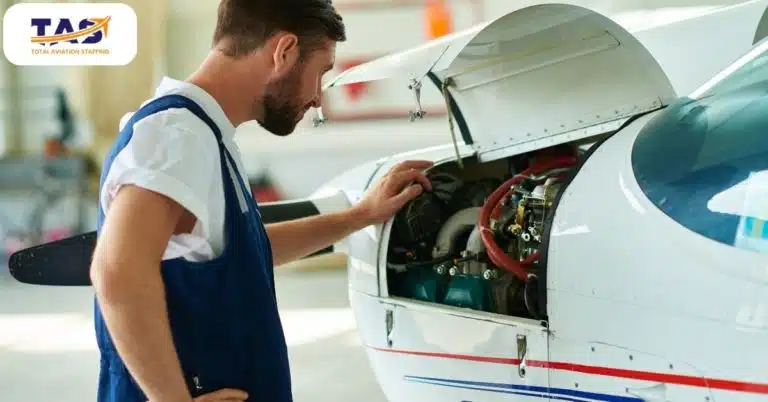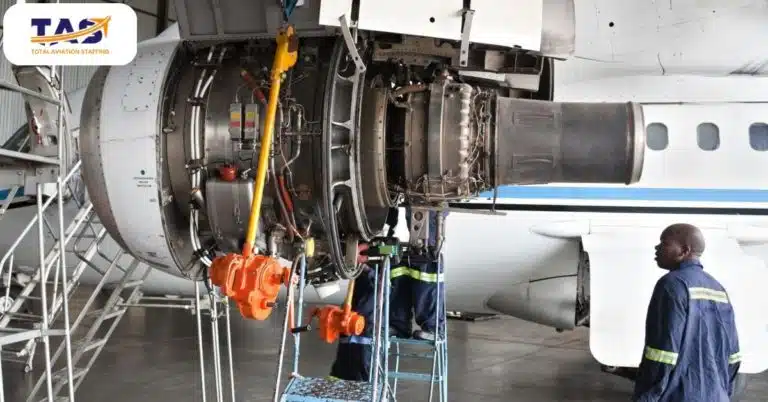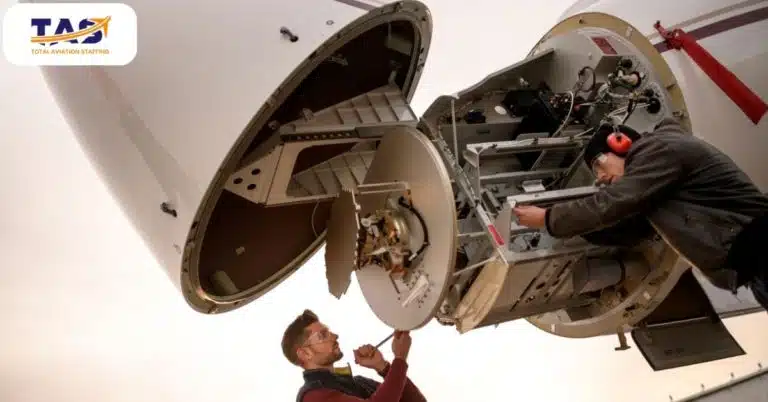The Roles and Responsibilities of a Repair Service Coordinator

When it comes to aviation, safety, and efficiency are of utmost importance. That’s where the Repair Service Coordinator comes in. Acting as a crucial liaison between engine groups, repair shops, sales teams, and customers, this role ensures proper communication of repair order status and oversees the repair process from start to finish.
From raising repair orders and evaluating repair costs to coordinating dispatch and problem-solving, the Repair Service Coordinator plays a vital role in keeping aviation engines running smoothly. This time, we’ll dive into the roles and responsibilities of a Repair Service Coordinator in aviation, exploring the skills and qualities needed to excel in this important position. So buckle up and let’s take off on this journey together!
1. Coordinating the Repair Process
As a Repair Service Coordinator, your primary responsibility is to coordinate the repair process for engine aircraft parts with outside vendors. This involves overseeing the entire repair process from start to finish, ensuring that it is completed within the company’s expectations and industry standards.
To successfully coordinate the repair process, you will need to work closely with the Engine Technical Group, which is responsible for identifying and diagnosing any issues with the engine parts that require repair. The Engine Technical Group will provide you with the necessary information about the parts that need repair, including the type of repair needed, the expected turnaround time, and any other specific requirements.
Once you have this information, you will need to identify and select the most suitable vendors for the repair job. This involves evaluating the capabilities, experience, and quality standards of potential vendors to ensure that they can meet the company’s expectations and industry standards.
The role of a Repair Service Coordinator is critical in ensuring that engine aircraft parts are repaired efficiently and effectively. By coordinating the repair process with outside vendors, you can help ensure that the company’s expectations and industry standards are met, while also ensuring that repair costs are managed within the budget.

2. Liaison Between Departments
The Repair Service Coordinator facilitates smooth communication between different departments to ensure the timely and satisfactory completion of repair orders. Collaboration with the engine group, repair shop, sales team, and customers is essential in fulfilling this responsibility.
The following are some of the key qualities that are essential for an effective liaison in this role:
Excellent Communication Skills: The ability to communicate effectively with different stakeholders, including customers, technicians, and sales teams, is crucial to ensure that everyone is on the same page about the repair order’s status.
Strong Attention to Detail: The Repair Service Coordinator must be able to pay close attention to details, including the repair order’s progress, timelines, and budget to ensure that the repair is completed successfully.
Customer-Focused Approach: A customer-focused approach is vital in this role as the coordinator will often have to deal with customers who may be frustrated with the repair process. A good liaison will be able to manage customer expectations and ensure that they are satisfied with the repair order’s outcome.
Organizational and Time Management Skills: The ability to multitask and prioritize tasks is critical to managing the various components involved in a repair order effectively.
To excel as a liaison between departments in a repair service, it’s important to have an in-depth understanding of the repair process and the different departments involved. Additionally, being able to manage conflicts and build relationships with various stakeholders will help to ensure a smooth repair process. Ultimately, the coordinator’s success depends on their ability to facilitate communication and collaboration between different departments while maintaining a customer-focused approach.

3. Raising Repair Orders
Raising repair orders based on engine forecast demands or requests from the Engine Sales Team is a crucial responsibility of the Repair Service Coordinator, as it outlines the repair scope, estimated cost, timelines, and parts required for the repair work.
The following are some key points to consider for an effective repair order-raising process in this role:
Accurate and Detailed Information: The Repair Service Coordinator must ensure that the repair order contains accurate and detailed information about the engine parts that require repair, including the engine type, serial number, and component details. Providing accurate information is essential for ensuring that the repair work is carried out correctly and within the estimated timelines.
Timely Completion: The Repair Service Coordinator must ensure that repair orders are raised promptly and completed within the expected timelines. This involves coordinating with the repair shop and the engine group to ensure that the necessary parts are available and that the repair work can be completed efficiently.
Communication: The Coordinator must communicate effectively with the engine group, repair shop, and sales team to ensure that everyone is aware of the repair order’s status. This includes providing regular updates on the repair work’s progress, timelines, and costs to ensure that everyone is on the same page.
Documentation: The Coordinator must maintain accurate documentation of all repair orders raised and completed, including the costs and timelines. This documentation is essential for future reference and for ensuring that the repair work meets regulatory requirements.
The Repair Service Coordinator plays a crucial role in raising and managing repair orders to ensure that engine parts are repaired efficiently and effectively. By ensuring accurate and detailed information, timely completion, effective communication, and documentation, the Coordinator can help ensure a seamless repair process and maintain customer satisfaction.

4. Requesting for Quotations
Requesting repair quotations from vendors and repair shops is a crucial responsibility of the Repair Service Coordinator, which involves preparing RFQs, identifying potential vendors, and evaluating quotations to choose the most suitable vendor for the repair work.
The following are some key points to consider for an effective quotation-requesting process in this role:
Vendor Selection: The Coordinator must identify and select potential vendors or repair shops based on their capabilities, availability, and reputation. This involves researching and evaluating potential vendors and selecting those that meet the repair work’s requirements.
Preparing RFQs: The Coordinator must prepare RFQs that contain accurate and detailed information about the repair work required, including the scope of work, timelines, and budget. The RFQs must be sent to the selected vendors in a timely manner, and the Coordinator must ensure that all necessary information is included to ensure accurate and timely quotations.
Quotation Evaluation: The Coordinator must evaluate the quotations received from the vendors based on various factors, including price, quality, and timelines. The evaluation process must be fair and transparent, and the Coordinator must ensure that the selected vendor meets all the requirements for the repair work.
In order to facilitate a smooth and satisfactory repair process, the Repair Service Coordinator assumes a crucial responsibility in soliciting quotations from vendors. By carefully selecting vendors, creating detailed and precise RFQs, and objectively evaluating quotations, the Coordinator helps to ensure the efficient and effective execution of the required repair work. This enables the company to maintain high levels of customer satisfaction and uphold its reputation for quality service.

5. Evaluating Repair Cost Estimates
As a Repair Service Coordinator, a key responsibility is evaluating and reviewing repair cost estimates from vendors to ensure that the repair costs are reasonable and competitive. This involves analyzing the details provided by the vendors, including the scope of work, labor costs, material costs, and overheads.
The following are some key points to consider for an effective evaluation of repair cost estimates in this role:
Cost Analysis: The Coordinator must conduct a detailed analysis of the cost estimates provided by the vendors to ensure that all costs are reasonable and necessary. This includes evaluating the cost of parts, labor costs, and overheads, and comparing them with industry standards and benchmarks.
Negotiation: The Coordinator must be skilled in negotiation to ensure that the repair costs are at their lowest possible while still maintaining the required quality of work. Negotiation with vendors may involve discussing alternative repair methods, sourcing alternative parts, or exploring options for reducing overheads.
Quality Assurance: The Coordinator must ensure that the repair work’s quality is not compromised in the pursuit of lower costs. This involves ensuring that the selected vendor has the necessary expertise and experience to carry out the repair work to the required quality standards.
With their sharp analytical skills and savvy negotiation tactics, the Repair Service Coordinator is a true hero in the fight against excessive repair costs. By carefully evaluating and negotiating repair cost estimates, they help to ensure that the required repair work is carried out efficiently and effectively, without breaking the bank.

6. Inputting Required Information
The Repair Service Coordinator is responsible for inputting all necessary information and quotes from repair shops into Unical’s web portal RO module or Quantum as required. It is crucial that the Coordinator enters accurate and up-to-date information to ensure a smooth repair process.
This includes verifying the repair order number, customer and vendor details, parts required, and repair work scope. By prioritizing the timely and accurate inputting of information, the Coordinator can help to avoid errors, reduce delays, and maintain a high level of customer satisfaction.
Through effective information inputting, the Repair Service Coordinator helps to ensure that all parties involved in the repair process have access to the most current information. This can be particularly important in situations where changes to the repair work scope, vendor information, or parts required occur.
By keeping the portal updated, the Coordinator can provide transparency and ensure that all stakeholders have the information they need to make informed decisions. Overall, the role of the Repair Service Coordinator in inputting required information is crucial in supporting the Engine team and ensuring efficient and effective repair processes.

7. Planning and Coordinating with Vendors
The role of the Repair Service Coordinator in planning and coordinating with vendors is critical to ensuring efficient and effective repair processes. The Coordinator must establish clear communication with vendors and work collaboratively to identify potential issues and develop solutions to address them. By doing so, the Coordinator can help to ensure that repair projects are completed on time and to the highest quality standards, while also minimizing delays and maintaining a high level of customer satisfaction.
To be effective in this role, the Repair Service Coordinator must be able to establish strong relationships with vendors and understand their capabilities and limitations. They must also be able to effectively communicate project timelines, deadlines, and specific requirements for the repair work, and provide regular updates on the repair progress. By taking a collaborative approach and working closely with vendors, the Coordinator can identify potential issues and develop solutions that optimize the repair process. Overall, the success of repair projects often depends on the ability of the Repair Service Coordinator to plan and coordinate effectively with vendors, making this a critical role in supporting the Engine team.

8. Reviewing Repair Work Scope
Ensuring that repair work is done to meet the customer’s needs and company requirements is a crucial responsibility of a Repair Service Coordinator. By evaluating and reviewing the repair work scope from vendors, the Coordinator ensures that the work is of high quality and meets the necessary standards. In this way, the Coordinator plays a vital role in guaranteeing customer satisfaction and maintaining the reputation of the company.
To effectively review the repair work scope in this role, it’s essential to consider the following key points:
Compliance with standards: The Coordinator should review the repair work scope to ensure that it is compliant with the required standards, regulations, and safety requirements. This includes ensuring that the repair work meets the customer’s specifications and any applicable industry standards.
Quality assurance: The Coordinator should evaluate the repair work scope to ensure that it includes all necessary steps to complete the repair work to a high standard. This includes checking that the repair work scope is comprehensive, detailing all necessary repair work, and any required parts or equipment to complete the work.
Reviewing the repair work scope is a critical responsibility of a Repair Service Coordinator. By doing so effectively, they can minimize the risk of issues and delays, and ensure high-quality repair work that meets customer requirements. Ultimately, this helps the Engine team rev up its success!

9. Dispatching Repairs
A smooth and efficient repair process doesn’t just end with coordinating the repair work – it also involves ensuring that the repaired parts reach the customers in a timely and efficient manner. This is where the coordination of dispatch comes into play, and it’s a crucial responsibility of a Repair Service Coordinator. The Coordinator works closely with the warehouse personnel to ensure that the parts are shipped out promptly and meet the customers’ needs.
Things to consider for effective repair dispatching include:
Coordination with warehouse personnel: The Coordinator must work closely with the warehouse personnel to ensure that the repaired parts are dispatched in a timely manner. This includes coordinating the shipping process and updating the shipping information on invoices to ensure that they match the sales personnel’s requirements.
Timely delivery: The Coordinator must ensure that the repaired parts are dispatched to the customers in a timely manner. This includes tracking the shipment and following up with the logistics team to ensure that any potential delays are addressed promptly.
With the Repair Service Coordinator’s effective dispatching of repairs, customers can receive top-quality service and timely repairs, leading to overall satisfaction and success for the Engine team. The Coordinator’s role in this process is vital, ensuring repairs are completed to the highest standards and maintaining positive relationships with customers.

10. Problem-Solving
The Coordinator is responsible for identifying potential problems and developing solutions to overcome them. This requires a proactive approach to analyzing and gathering information to determine the best course of action. Effective communication with various stakeholders is also essential in this role.
The Repair Service Coordinator’s role in problem-solving is crucial to ensuring that repairs meet high standards and customers receive top-notch service. By effectively identifying and addressing issues that arise during the repair cycle, the Coordinator fosters customer satisfaction, strengthens relationships, and contributes to the Engine team’s success.

In Conclusion
The Repair Service Coordinator is the glue that keeps the aviation engine repair process together. With their excellent communication skills, attention to detail, and problem-solving abilities, they ensure that repairs are completed efficiently, safely, and at the lowest cost possible. From coordinating with vendors and dispatching repairs to review repair work scopes and inputting information accurately, the Repair Service Coordinator is a vital part of the aviation industry. So, next time you’re flying high in the sky, take a moment to appreciate the hard work of these unsung heroes who keep us all soaring smoothly.
Ready to take your career in the aviation industry to the next level? With Total Aviation Staffing, you can launch your aerospace and aviation career today! Our team of highly experienced industry professionals will help you find the perfect job for you, from an A&P Mechanic to a Flight Attendant. We’ll even help you build your resume and apply for aviation job openings. So, don’t wait to get started! Get your wings today with Total Aviation Staffing. Fly into a successful aerospace career – get in touch now!
